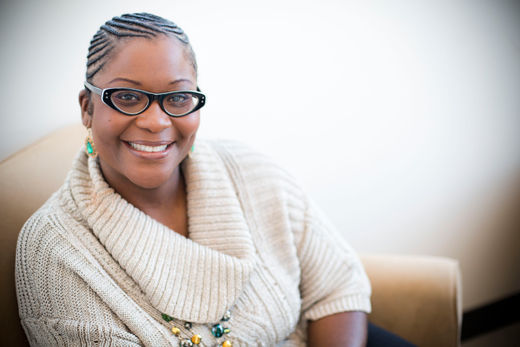Nichole Phillips was on her way to medical school when she heard a different calling.
"I had always been interested in religion, but medical school was my goal," recalled Phillips, an assistant professor of religion and human difference in Emory's Candler School of Theology. "Taken together, I thought I would be a more empathetic, compassionate physician."
So she embraced them both: an undergraduate biochemistry major and religion minor who was both president of her pre-med society and deeply involved in ministry to black women through Ethos, a Wellesley College student organization for women of African descent.
With research interests that today span religion, psychology, African American history and culture, as well as community and ritual studies, Phillips still considers herself a scientist: "I'm both a social scientist of religion and a practical theologian," she explains.
As a Humanistic Inquiry Program (HIP) Fellow, a position supported through a grant from the Andrew W. Mellon Foundation to strengthen the humanities and expand interdisciplinary inquiry, Phillips is in her element — among a new generation of humanities scholars with both deep training in the humanities and broad training in other areas.
"I think it's wonderful," she says. "Because I hold science and religion in tension, I've always been interdisciplinary. I'm bringing sociology, anthropology and ethnography into the conversation about the science of religion."
The power of religious ritual
Intrigued with religious studies, Phillips attended Harvard Divinity School for her first master's degree, but medical school remained firmly in her sights.
"I did it so I could be a more theologically formed physician," she recalls. "I started with medical ethics and religion as a concentration."
"Being able to critically engage the issues of prominence and relevance of the day, to be able to impact thought in that way, I think that's what divinity school gave me," Phillips says. "I got to dig deeper into the subjects that I love — it was a life transforming experience."
For her doctoral work, Phillips continued at Vanderbilt University's Graduate Department of Religion, where she completed a MA in religion and a PhD in religion, Psychology and Culture. Her dissertation showcased ethnographic research on ritual, race, evangelical faith, and Southern civil religion in a rural West Tennessee community.
She arrived at Emory in 2012 as a postdoctoral fellow in the Practical Theology and Religious Practices program at Candler, in collaboration with Emory's Graduate Division of Religion, where her research explores the power of religious rituals in creating social cohesion and dismantling the barriers that divide us, among other areas of interest.
"I use the social sciences as an analytical tool, but the actual humanistic discipline is the study of religion," she explains. "I was hired to teach community, congregational and ritual theory and methods — very much from a cultural studies perspective."
Scholarship that engages students
As a result, Phillips' course listings span a rich spectrum of scholarship: Black Religion and Black Consciousness; Rituals: Priestly and Prophetic Practices of Congregations; and Redeeming Memories: Cultural Memory, Christian Witness, and Social Genocide.
"We deal with very real, contemporary issues and look for the answers religion and theology brings to those perspectives," Phillips explained. "The classes enable them to draw on their personal experiences and backgrounds. I provide the tools for them to go out into the community and look for answers."
So for her class on "Trauma, Culture and Memories," students learn about groups that have faced social genocide — from Holocaust survivors to Native Americans — and consider the role theology plays in redeeming cultural trauma.
Her course in "Ritual Theories," taught from a social scientific perspective, examines the socially transformative nature of rituals. Elementary ethnographic research led one of Phillips' students to return to her rural North Carolina community in order to study the "welcome moment" at her own church, a tradition that had long been in place, was removed by a new pastor and then reinstated.
"She came to understand it as an important part of the service, something that does bond the church community," Phillips recalls. "It wasn't just form and fashion, it was a chance for people to catch up. When you have social cohesion, all kinds of things happen in that space."
In her own research, Phillips continues to explore the role of rituals in sacralizing public and private space. She is currently revising for publication her doctoral dissertation, which examines what death rituals disclose about Southern Christianity, race and politics in a rural West Tennessee community.
And she's settling into a teaching role that has already presented surprising rewards.
"I think it's coming together for me now," Phillips says. "I've realized that I really love teaching, that engagement with students. They ask a million questions and you wonder if you have all the answers. But you have to have the humility to say, 'Here is my answer — I'm willing to do the research to find out more.'
"While I am the expert in particular areas, they come to me with questions that I may not have even thought about. So while I'm a teacher, I'm also a learner," she adds. "I really do love that."

